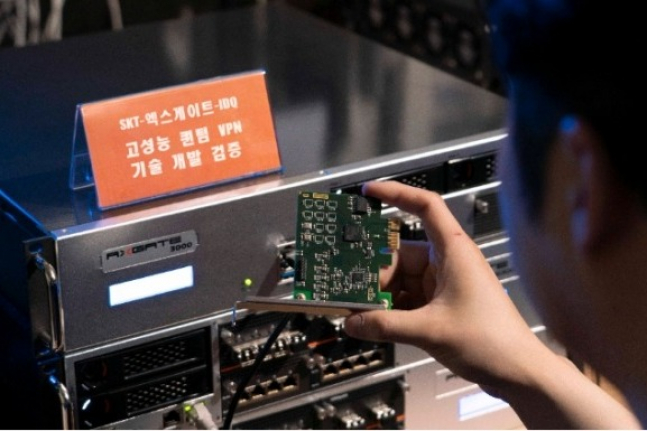SK Telecom develops quantum cryptography-based VPN
It augments encryption with quantum random number generation, aims to enter the security industry
By May 17, 2023 (Gmt+09:00)
LG Chem to sell water filter business to Glenwood PE for $692 million


Kyobo Life poised to buy Japan’s SBI Group-owned savings bank


KT&G eyes overseas M&A after rejecting activist fund's offer


StockX in merger talks with Naver’s online reseller Kream


Mirae Asset to be named Korea Post’s core real estate fund operator



South Korea's SK Telecom Co. announced on Wednesday that has completed the development of quantum key distribution (QKD) technology-based virtual private network (VPN), in collaboration with SK Square's subsidiary IDQ, network security equipment company AXGate.
VPN is a technology used to protect data exchanged within the internal networks of companies or organizations. It offers a cost-effective solution compared to building separate dedicated networks. The application of high-level security technology for encryption and decryption during data transmission is crucial for ensuring data protection.
The quantum cryptography-based VPN incorporates quantum communications technology, which is considered the highest level of security technology available. By utilizing quantum random number generation technology, it significantly enhances security compared to traditional encryption methods that could be vulnerable to hacking through quantum computing.
Moreover, the implementation of QRNG chipset in AXGate's VPN equipment eliminates the need for additional devices beyond the existing VPN infrastructure. The monthly usage fee remains the same as conventional VPNs, making it economically efficient.
The importance of security technology has increased due to the rapid development of artificial intelligence (AI) technology, which has gained significant attention recently. As cyber threats such as AI-based cyber attacks and the mass production of malicious codes become more prominent, the need for cybersecurity is growing rapidly.
In 2022, the domestic security market in South Korea grew by 9% compared to the previous year, reaching a size of 6.72 trillion won ($5 billion). It is expected to continue growing by 4.8% and 3.8% in 2023 and 2024, respectively.
The global market size of quantum cryptography is projected to experience rapid growth, with an average annual growth rate of 39.8% since 2022. It is expected to reach a size of 24.58 trillion won ($18.34 billion) by 2030.
SK Telecom, together with SK Shieldus and AXGate, plans to actively move into the market, particularly in industries that require a high level of security, such as defense, public and financial services sectors.
Write to Seung-Woo Lee at leeswoo@hankyung.com
-
 EarningsSK Telecom to further develop AI, its growth driver in Q1
EarningsSK Telecom to further develop AI, its growth driver in Q1May 10, 2023 (Gmt+09:00)
3 Min read -

-
 Artificial intelligenceSK Telecom, Golfzon develop AI golf platform
Artificial intelligenceSK Telecom, Golfzon develop AI golf platformApr 27, 2023 (Gmt+09:00)
1 Min read -
 Artificial intelligenceSK Telecom invests $11 mn in AI startup Scatter Lab
Artificial intelligenceSK Telecom invests $11 mn in AI startup Scatter LabApr 24, 2023 (Gmt+09:00)
1 Min read


